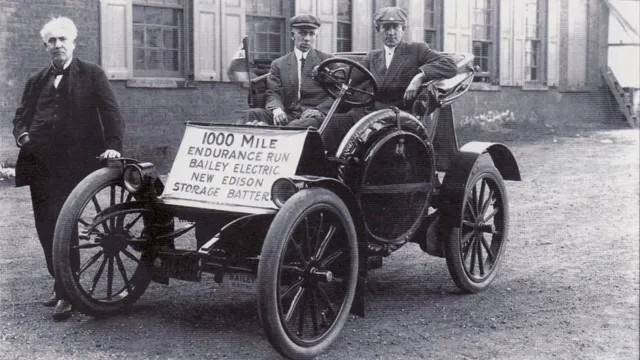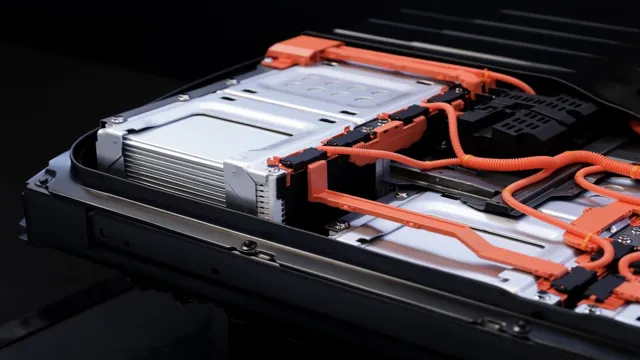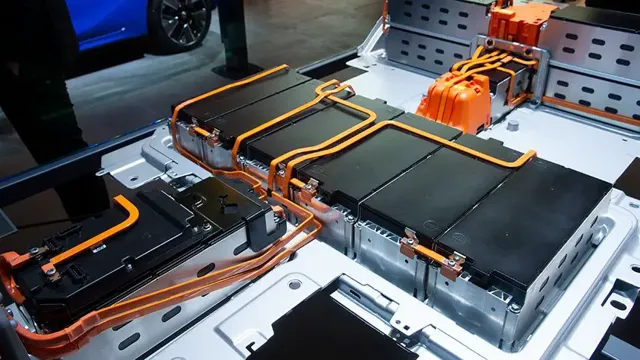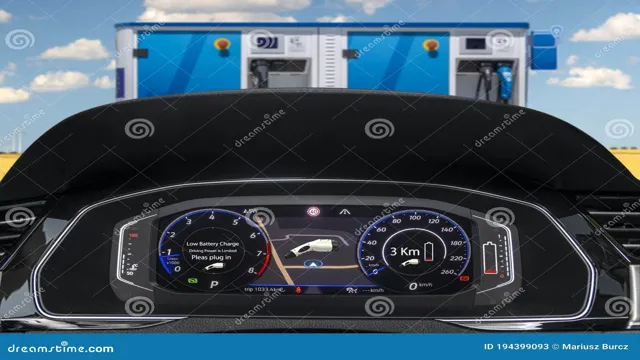Powering the Future: 10 Eye-Opening Electric Car Battery Facts You Need to Know
Have you ever wondered about the science behind electric car batteries? These innovative powerhouses have transformed the automotive industry, offering eco-friendly and efficient transportation options. But how do they work, and what makes them different from traditional gasoline-powered cars? In this blog post, we’ll delve into some fascinating facts about electric car batteries, including their composition, lifespan, and charging process. So sit back, buckle up, and get ready to learn about the power source behind some of the world’s most cutting-edge vehicles.
1. Energy density
When it comes to electric car battery facts, energy density is a crucial concept to understand. Energy density refers to the amount of energy that can be stored in a battery per unit of mass or volume. A higher energy density means that a battery can store more energy in a smaller space or weight.
This is important for electric cars, as they need to be lightweight and compact in order to be practical for everyday use. The challenge for battery manufacturers is to improve energy density while still maintaining safety and durability. As technology continues to improve, we can expect to see electric car batteries with higher and higher energy densities, making electric cars even more practical and efficient.
High energy density allows for longer range and smaller batteries
Energy density is a vital factor in electric vehicle technology. High energy density means that batteries can be made smaller, yet provide a longer range. This is because these batteries can store more energy per unit of volume or weight.
Essentially, it means that more energy can be packed into the same physical space. Higher energy density batteries are therefore in high demand, especially for electric vehicles that require a lot of power for acceleration and sustained driving. The higher the energy density, the more efficient the battery is, both in terms of cost and performance.
In short, energy density is a key element in electric vehicle technology, and advancements in this area will lead to widespread adoption of electric vehicles in the near future.
Lithium-ion batteries are common in electric cars
One of the reasons why lithium-ion batteries are common in electric cars is their high energy density. This means they can store a lot of energy in a small amount of space, making them ideal for use in electric vehicles where space is at a premium. Essentially, this means that an electric vehicle can travel further on a single charge compared to other types of batteries.
The energy density of lithium-ion batteries has increased significantly over the past few years, making them an even better solution for electric cars. In fact, some newer electric car models are able to travel up to 300 miles on a single charge, making them a viable alternative to traditional combustion engine vehicles. So, if you’re considering purchasing an electric vehicle, rest assured that the lithium-ion batteries powering your car are a reliable and efficient option.
2. Charging time
When it comes to electric car battery facts, charging time is one of the most important factors to consider. Unlike traditional cars, electric vehicles require charging to function, and the amount of time it takes to charge the battery can vary greatly depending on different factors. The battery size, charger type, and charging speed all play a role in how long it takes to charge an electric car.
On average, it takes around 8 hours to fully charge an electric car using a level 2 charger, which can be installed at home or at work. However, there are also fast-charging options that can provide an 80% charge in as little as 30 minutes. It’s important to note that charging times will vary depending on the make and model of the electric car, so it’s important to do your research before purchasing.
Overall, knowing the charging time for an electric car is essential for planning longer trips and understanding the maintenance requirements for the battery.
Charging can take from 30 minutes to several hours
Charging time for electric vehicles can vary depending on several factors, such as the capacity of the battery, the type of charger being used, and the charging level required. With a fast charger, charging an EV battery up to 80% can take as little as 30 minutes, but a full charge can take several hours. On the other hand, using a standard household outlet may take up to 20 hours to fully charge the battery.
The charging time also depends on how often the battery is charged, as frequent charging may cause the battery to degrade more quickly. Hence, it is recommended that EV owners charge the battery regularly but avoid charging to the maximum limit. Proper charging habits can prolong the battery life of the EV, increase its efficiency, and reduce the need for frequent charging.
So, next time if you are planning for a long drive, make sure to plan your breaks during which your EV can charge up. Overall, the charging time for an EV can vary, but with proper planning and use, this should not be a concern.
Fast chargers can charge up to 80% in less than an hour
When it comes to electric vehicles, one of the biggest concerns for owners is charging time. Luckily, with advancements in technology, charging times have significantly improved. Fast chargers can charge up to 80% in less than an hour, making it much more convenient for drivers to get back on the road.
However, it’s important to note that the charging time can also be affected by the battery size, temperature, and charging rate. The larger the battery, the longer it will take to charge, and extreme temperatures can also affect the charging time. Nevertheless, fast chargers have revolutionized the way electric vehicle owners think about charging, making it much more feasible to take long road trips without worrying about running out of power.
So, if you’re in the market for an electric vehicle, consider the charging time and make sure to take advantage of fast chargers whenever possible.
3. Battery life
Electric car battery facts are essential for anyone considering making the switch to an electric vehicle. One of the most important factors to consider when buying an electric car is the battery life. Under ideal conditions, electric car batteries can last up to 20 years, but in reality, they usually last around 8-10 years depending on how often they are charged and discharged.
The battery’s lifespan also depends on the type of battery technology used, with lithium-ion batteries being the most common type currently used. It’s essential to keep in mind that extreme temperatures can affect the battery’s performance, with very hot or very cold conditions reducing its lifespan. Fast charging and heavy use can also take their toll on the battery’s capacity over time, which is why it’s important to use the appropriate charging points and make sure the battery is never fully discharged.
Overall, there are many important aspects to consider when it comes to electric car batteries, so it’s essential to do your research and choose the best option for your needs.
Batteries degrade over time and with use
Battery life is a crucial factor that affects our use of electronic devices. Unfortunately, it’s no secret that batteries can degrade over time and with use. This is particularly true for rechargeable batteries, as each time they are recharged, a little bit of their capacity is lost.
In general, a battery’s life can vary depending on various factors such as temperature, frequency of use, and the type of battery used. For instance, Lithium-ion batteries, which are commonly used in smartphones and laptops, have a finite life span of around 300-500 charge cycles. It’s essential to note that battery degradation is inevitable and cannot be avoided, but there are ways to extend the life of your battery.
Simple tricks, such as reducing screen brightness, turning off Bluetooth and Wi-Fi when not in use, and using airplane mode, can drastically prolong the life of your battery. So, if you want your battery to last longer, it’s essential to take good care of it and make sure that you’re using it efficiently.
Battery warranties typically last 8-10 years
Battery life is a crucial factor to consider when purchasing an electric vehicle. Manufacturers often provide a battery warranty that typically lasts 8-10 years, which gives a good indication of how long the battery is expected to last. However, there are several factors that can impact the actual lifespan of the battery, including temperature, usage, and charging habits.
For example, extreme heat or cold can degrade the battery faster, while frequent fast charging can also reduce its lifespan. It’s important to make sure you understand the recommended charging practices for your specific electric vehicle to maximize the battery’s life. Additionally, keeping the battery level between 20% and 80% can help prolong its life as well.
Remember to also consider the expected battery range and charging time when selecting an electric vehicle to ensure it meets your needs. By taking these factors into consideration, you can make an informed decision and enjoy your electric vehicle for many years to come.
4. Environmental impact
One of the most important concerns when it comes to electric cars is their environmental impact, which largely revolves around their batteries. While electric car batteries are more eco-friendly than traditional gasoline engines, they still contribute to their fair share of environmental concerns. One major issue is the sourcing of materials, such as lithium and cobalt, which are used in the production of these batteries.
Mining for these materials can be harmful to the environment and can lead to water pollution, soil contamination, and more. Additionally, the handling and disposal of electric car batteries can also have negative environmental impacts if not done responsibly. However, as the demand for electric cars grows, companies are striving to improve the production, sourcing, and disposal processes to minimize these impacts.
By being mindful of the full lifecycle of electric car batteries, we can work towards a more sustainable and eco-friendly future.
Battery production and disposal can have environmental impact
Battery production and disposal can have a significant environmental impact. The manufacturing process of batteries involves the emission of harmful pollutants and the consumption of large amounts of energy and resources. For instance, the production of lithium-ion batteries releases substantial amounts of greenhouse gases, energy, and water, and generates toxic waste materials that pose potential hazards to the environment.
Also, the disposal of batteries can have adverse effects on the ecosystem and human health, as the chemicals seep into the soil and groundwater and the toxic substances are released into the air when incinerated. In addition, extracting raw materials for batteries can have detrimental effects on local communities and ecosystems, particularly in developing countries where mining activities may lead to deforestation, water pollution, and land degradation. Thus, it is crucial to consider the environmental impact of battery production and disposal and adopt sustainable practices to reduce the harm caused to the environment.
Electric cars still have lower lifetime emissions compared to gasoline cars
When it comes to environmental impact, electric cars still have a lower lifetime emissions compared to gasoline cars. While it’s true that electric cars may have higher emissions during production, their overall impact is still much lower. This is because gasoline cars emit a significant amount of emissions over their lifetime, from the extraction of oil to the transportation and refinement process.
Electric cars, on the other hand, have no tailpipe emissions and rely on cleaner energy sources like wind or solar power. Additionally, the battery technology used in electric cars is only improving, making them even more environmentally friendly. Although still not perfect, electric cars are a step in the right direction for reducing our carbon footprint.
Conclusion
In conclusion, electric car batteries have come a long way from the bulky and inefficient designs of the past. With improvements in technology, they have become increasingly sleek, powerful, and affordable. Not only do they offer a more sustainable mode of transportation, but they also challenge the notion that electric cars are slow and unreliable.
So next time you hear someone spouting outdated battery facts, feel free to enlighten them with the power of your knowledge and a quick reminder that it’s time to charge up and hit the road!”
FAQs
What is the average lifespan of an electric car battery?
The average lifespan of an electric car battery is around 8-10 years.
Do electric car batteries require special maintenance?
Yes, electric car batteries require special maintenance such as keeping them at a consistent temperature and avoiding deep discharges.
How long does it take to charge an electric car battery?
It can take anywhere from 30 minutes to 12 hours to fully charge an electric car battery, depending on the charging method and battery capacity.
Are electric car batteries recyclable?
Yes, electric car batteries are recyclable and can be repurposed for other energy storage applications.





